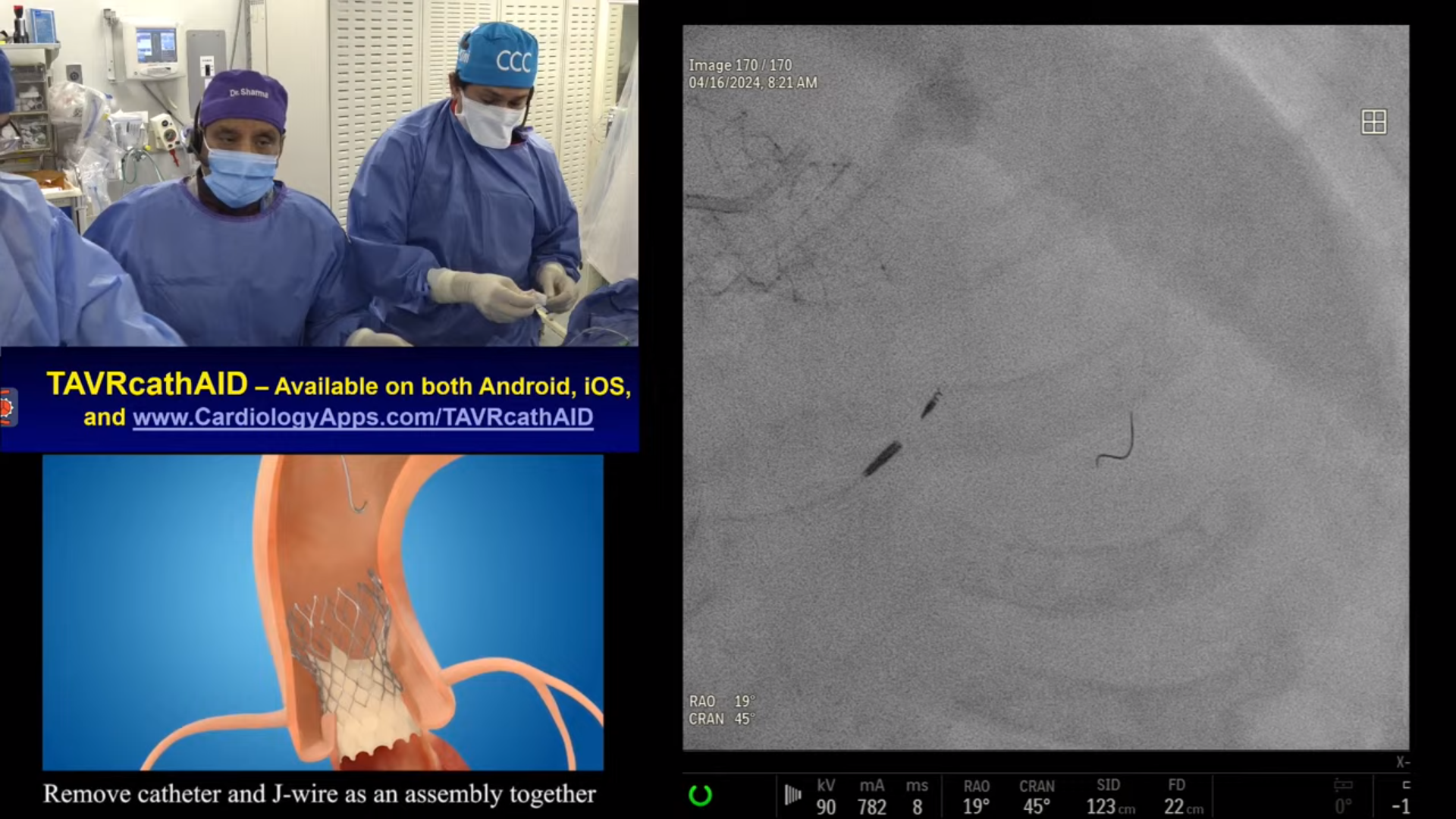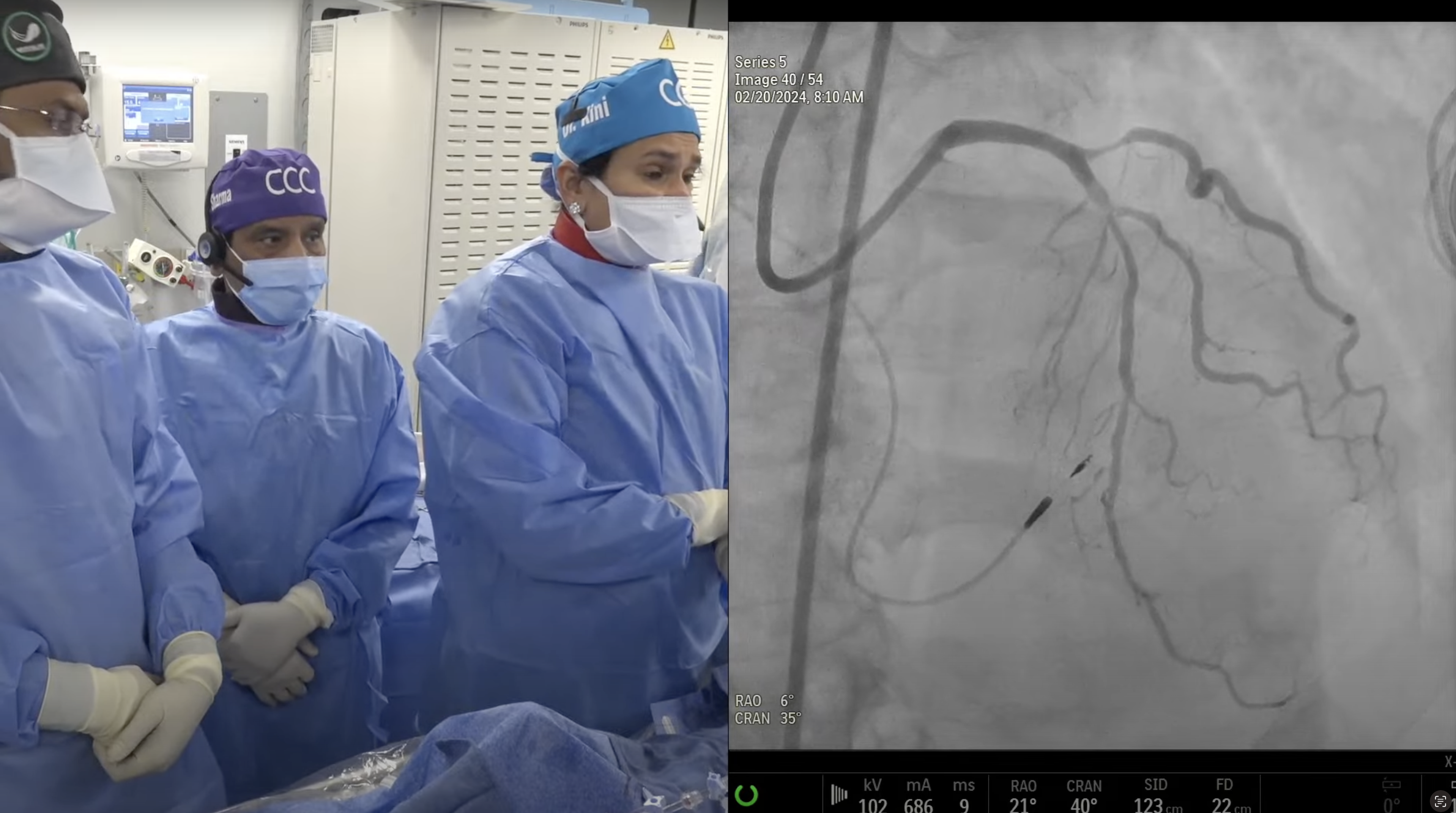47 year-old male NIDDM with new onset CCS Class II angina and high risk stress SPECT-MPI for large inferior, inferoseptal and inferolateral ischemia and EF of 53%. A Cardiac Cath on February 17, 2015 revealed II Vessel CAD; multiple lesions in RCA including 90% bifurcation lesion of distal RCA (Medina 1,0,1), 90% moderately calcified LCx OM1 with LVEF 60% and SYNTAX Score of 12. Patient underwent successful intervention of LCx-OM1 (Promus PREMIER DES). Patient is now planned for staged PCI of RCA for persistent Class II symptoms on MMT and complete revascularization.
Q&A
Q
You showed us the Manual prepared at Mt. Sinai. Is it useful only for Interventional Fellows or also for practicing Interventional Cardiologists?
A.
This practical Manual of Interventional cardiology, while specifically geared for fellows in training but can also be a useful resource for junior and senior practicing Interventionslists to refresh the technical steps of the complex procedures.
Q
Is there complete synergy between the live cases and the Manual materials?
A.
Absolutely there is a synergy between our live cases and Manuel because all steps we talk and do during our interventional cases, are the main content of the manual.
Q
Can the Manual serve as a companion for the ccclivecases?
A.
Yes as both are by far interlinked.
Q
Is the Manual also recommended for preparations of the Board for Interventional Cardiology?
A.
Yes the Manual covers at least 40-50 technical points which are the basis of Interventional Cardiology board questions.
Q
Are you planning the Manual as a regular publication every few years?
A.
Yes Dr Kini has already started to work on the second edition of the manual which will contain even more illustrations and online video of the technics and procedures.
Q
Are there other educational activities that are offered to Interventional Cardiology fellows? Do you offer a Board Review Course?
A.
Every week we have 3-4 educational sessions with fellows such as case discussion, coronary anatomy and journal club. Once a month we have Interventional board review Q&A with the fellows. We also have our annual Interventional Cardiology board review as the part of the CCC symposium and will be on June 16th this year.
Q
Regarding the Pegasus trial, do you feel a case can now be made for secondary prevention from Ticagrelor or is the trial simply hypothesis generating?
A.
In my opinion, Pegasus trial finally showed the benefit of long term DAPT in post MI pts but still increased the bleeding. Hence we are back to square one, where we need to make decision of longterm Ticagrelor considering the bleeding risk of the pt. I do not think that most of the Practioner will adopt the longterm Ticagrelor use; even 60 mg twice daily.
Q
There is ongoing work to reduce DAPT use for DES, now we have newer trials like Pegasus touting longer duration of therapy?
A.
Yes both DAPT trial post stenting and Pegasus trial post MI have convincingly shown benefit of longterm DAPT in reducing CV events but at the cost of higher bleeding risk. Hence a Practioner can take stand in favor or against longterm DAPT.
Q
What is your breakdown, post-PCI: Clopidogrel, Prasugrel and Ticagrelor?
A.
At Sinai post PCI we have 60% Clopidogrel, 25% Prasugrel and 15% Ticagrelor.
Q
Can you provide any update of BVS trials and experience at your institution?
A.
We were part of the Absorb III trial which will be presented at TCT this year and soon we will participate in Absorb IV which has angina reduction as the co-primary endpoint. We have used over 30 Absorb stents at Sinai. I personally have used over 100 Absorb stents in India. While we wait for the longterm data about Absorb stents benefit, it certainly takes additional 5-10 minutes more for the Intetventional procedure and has slightly higher ST rates unless careful attention to lesion preparation and post dilatation is done.





